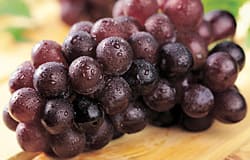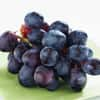- Science & Research
- Science News
- Newsletter
- 2014
- September 9

Newsletter
Newsletter
Resveratrol Reduces High Fat Diets Effects On Mitochondrial Function
Resveratrol reduces high fat diet's effect on mitochondrial function |
|||
Tuesday, September 9, 2014. An article published on August 23, 2014 in the Journal of Food Science reports the finding of a beneficial effect for resveratrol in preventing the adverse effects of a high fat diet on mitochondrial function and other factors. "High-fat diet is a significant risk factor for health, and mitochondrial dysfunction is one of the major events activating cell death pathways during high fat diet-induced oxidative stress," write Bin Wang and colleagues at China's School of Food Science and Technology in Jiangsu in their introduction. "We have already reported that several immune functions were changed in mice by high-fat feeding, indicating that the proinflammatory state of obese individuals might be related to chronic excessive nutrient intake." The team divided 24 mice to receive a normal diet, a high fat diet or a high fat diet enhanced with 0.06% resveratrol for twenty weeks. At the end of the experiment, blood and spleen cell samples were analyzed for regulatory T cell counts and other factors. While regulatory T cells in blood and spleen were reduced by the high fat diet, their survival was improved in animals that received resveratrol. Resveratrol was also associated with a decrease in the elevation of reactive oxygen species production and decline in mitochondrial function observed in the regulatory T cells of high fat diet-fed animals. Resveratrol was found to increase the expression of PGC-1alpha, a regulator of mitochondrial biogenesis, and reduce regulatory T cell apoptosis (programmed cell death). "This study has verified that resveratrol managed to protect T regulatory cells against apoptosis induced by high fat diet, with the subcellular mechanism being the relief of oxidative stress as well as the regulation of mitochondrial biogenesis and function," Dr Wang and colleagues conclude. "The results expand current understanding of the inflammatory response induced by high fat diet and provide a potential interventional strategy for the recovery of T regulatory cells by supplementing resveratrol." |
|||
| What's Hot | |||||||
| Grape seed and skin protect kidneys against effects of high fat diet | |||||||
An article published online on January 7, 2013 in the journal Applied Physiology, Nutrition, and Metabolism reveals the finding of Tunisian researchers of a protective effect for an extract of grape seed and skin against kidney dysfunction in rodents consuming a high fat diet. In their introduction to the article, Kamel Charradi and associates note that while cellular lipid overload has been associated with the dysfunction of several organs, including the heart and liver, its effect on kidney function is less well understood. However, they remark that lipotoxicity-induced oxidative stress has been found to be involved in the development of a variety of kidney disorders. The current research was intended to study the association between obesity-induced oxidative stress and kidney dysfunction, and to evaluate the potential protective properties of grape seed and skin extract. Twenty-four rats were divided to receive a high fat diet or standard diet for six weeks. The two groups were subdivided to receive a daily intraperitoneal injection of an extract of grape seed and skin or a control substance. At the end of the experiment, plasma samples were analyzed for indicators of kidney function, and the animals' kidneys were examined for lipid content, oxidative stress and other factors. Rats that received a high fat diet had increased kidney triglycerides and altered kidney function indicators linked to increased oxidative stress. These effects were reduced among those that received the grape seed/skin extract. The researchers suggest resveratrol, quercetin, catechins or unsaturated fatty acids as possible compounds in grape seed/skin extract that are responsible for the current study's findings. "The use of an antioxidant as grape seed skin extract could be beneficial in the prevention and treatment of high fat diet-induced kidney disturbances," they conclude. |
|||||||
Life Extension Clinical Research Update You, or someone you know, may qualify for a comprehensive weight management study. Supporting weight management with nutrition and physical activity are critical components for lifelong health. The Life Extension Foundation is proud to sponsor this clinical study that involves the utilization of a comprehensive weight management program. Study Objective: To Qualify:
Your Involvement:
Register For This Study https://www.lifeextension.com/clinicalresearch/ClinicalTrials.htm |
||||||||||
Health Concern
|
||||||||||
| Latest Products | |||||
 |
Super K with Advanced K2 Complex, 90 softgels Item #01724
|
||||
Vitamin K1 is the form found in plants and vegetables and should be part of most people's daily supplement regimen. Even more important is inclusion of the MK-4 and MK-7 forms of vitamin K2. Based on data substantiating the long-acting effects of MK-7, it is now possible to ingest fewer total micrograms of vitamin K but achieve far higher sustained blood levels of this critical nutrient. The latest Super K with Advanced K2 Complex formula provides vitamin K1 and the MK-4 and MK-7 forms of vitamin K2 in just one daily softgel. The virtue of this formula is that it provides the precise amount of the long-acting MK-7 form of vitamin K2 that recent human studies have shown provides optimal K2 levels over a 24-hour period. The MK-4 is included to provide the rapid increase in vitamin K blood levels that may account for its beneficial effects in certain studies. |
|||||
 |
|||||
| Disease Prevention and Treatment, 5th Edition | |||||
Life Extension's long-awaited 5th edition of Disease Prevention and Treatment, the latest guide to protecting against or improving the outlook of a wide range of health concerns, is now available in both hard copy and eBook form. Disease Prevention and Treatment is the outcome of decades of investigation by Life Extension into nutritional, alternative, or advanced therapies for conditions affecting Life Extension members or their loved ones — many of whom have been provided with few answers by allopathic medicine. While not a substitute for a physician's advice, the suggestions contained in Disease Prevention and Treatment can, in most cases, be combined with standard therapies or utilized to help prevent a more serious condition from developing in the first place. While Disease Prevention and Treatment is a valuable addition to any physician's reference library, it is written in a style accessible to the lay reader, and will appeal to anyone interested in improving their health and living longer. For those who can't wait to avail themselves of this important information, Disease Prevention and Treatment is available as an eBook as well as an impressive hardbound volume. "The breadth of thoroughly researched, innovative health content in Disease Prevention and Treatment is incredible. Everyone – patients and physicians alike – stands to benefit from owning this book." Julian Whitaker, MD, Whitaker Wellness Institute |
|||||
| Related Life Extension Magazine® Articles | |||
| Living Longer, Healthier Lives with Resveratrol | Mitochondria And Aging Conference On The Canary Islands | ||
 |
 |
||
The latest news on aging, nutrition, and vitamins
Lab
Testing
How Life Extension lab testing works



